About
The Portuguese Presidency of the Council of the European Union will hold a Conference on the topic of
“Culture, Cohesion and Social Impact”, on 5 and 6 May to take place in Serralves Foundation, Porto, Portugal.
Culture’s potential and impact can be a powerful means to address complex social problems faced by contemporary societies. This Conference marks the important discussion towards a better understanding of the benefits of culture for social cohesion and aims to come up with solutions to maximize culture’s social impact.
It is widely accepted that the cultural sphere constitutes a privileged interface for the production of meanings, expression of ideas, beliefs, identities, values, and experiences. Culture provides the social space for dialogue, community gathering, sharing and celebration, while allowing for negotiation, praise, and criticism.
This role of culture becomes even more important in a post-pandemic world shattered by social distancing and related mental health issues, worsening environmental challenges, rampant levels of inequality and intolerance, and asymmetrical territorial development patterns. However, it is not possible to fully mobilize culture’s potential for the harmonious development of our societies and of our lives without matching cultural policies.
Cultural policies which are truly fit for the future shall empower individuals to be active creators of culture and living participants in a broad and open dialogue between citizens and communities, instead of focusing on the public as a mere audience or as a mass of cultural consumers. However, barriers to full and equal participation in the cultural sphere persist. Also, cultural agents themselves face significant difficulties now amplified by the pandemic crisis.
This event will bring together cultural players, thinkers, academics, and political and governmental officials from all over the European continent, with the aim of mobilizing Europe to unlock the potential of culture for social cohesion and current societal challenges.
Agenda
-
Day 1
5 of May 2021 -
Day 2
6 of May 2021
Opening Session
Gabriel Bastos, Secretary of State for Social Security
Mariya Gabriel, European Commissioner for Innovation, Research, Culture, Education and Youth
Rui Moreira, Mayor of Porto
Graça Fonseca, Portuguese Minister of Culture
10:05Plenary session: The Social Impact of Culture
Culture and creativity are a powerful resource to re-imagine the world, to confront contemporary contradictions and to develop fair, sustainable, and democratic ways out of this multi-faceted complex crisis. This is only possible by overcoming barriers to active and meaningful participation in the cultural sphere. This session will present an opportunity to rethink and reconsider the place of culture in addressing social issues with a view to ensure a meaningful coexistence with each other and with the surrounding environment.
Clémentine Daubeuf, Associate Director at KEA
Hugo Cruz, Theatre director, Cultural programmer and Researcher
Jonathan Gross, Research Fellow, King’s College London
Sara Barriga Brighenti, Deputy Commissioner, National Plan for the Arts
10:30 – 11:45Coffee-break
11:45 – 12:00Panel 1: Culture, Mental health and Well-being
The relationship between culture, health and well-being has been gaining growing scientific backing and acquires a renewed importance in the context of health challenges and social isolation. Culture activates key neural reward circuits and improves social cognition and connectedness, which are crucial for social cohesion and trust building. This panel shall explore ways for culture to re-emerge as a necessary element for a fuller, happier, and richer life that provides spaces for self-expression, for learning, for meaningful encounters with the other and for the discovery and practice of individual skills and abilities.
Pier Luigi Sacco, Senior Advisor at OECD, Paris and Trento; IULM University, Milan, and metaLAB (at) Harvard.
Ugnė Grigaitė, PhD Fellow at Lisbon Institute of Global Mental Health, also associated with the Lithuanian Human Rights Monitoring Institute and NGO Mental Health Perspectives
Isabel Loureiro, Professor at Portuguese National School of Public Health and Vice-president of National Health Council
Mikael Odder Nielsen, Musicologist and project leader of Aalborg’s Culture by Prescription
Sandro Resende, Visual Artist and Head of ‘Manicómio’ art project based in a psychiatric hospital in Lisbon
12:00 – 13:30Lunch
13:30 – 14:30Panel 2: Culture, Cohesion and Territory
Heritage, architecture, and expressions of creativity in all their diversity constitute themselves as drivers of economic and social development, guiding multiple regional strategies of smart specialization, adopted both in cities and in urban peripheries and low-density territories. This panel shall approach the link between territorial development and culture, by aiming at harnessing culture’s power to foster community gathering, empowerment, and the sense of belonging, while valuing local heritages, memories, and traditions.
Aida Carvalho, President of the Board of Directors of Fundação Côa Parque
Stella Kyvelou–Chiotini, Panteion University of Social and Political Sciences; Eastern-Mediterranean Sea-Basin MSP Focal Point, European MSP Platform (DG MARE / EASME)
Luís Costa, Binaural Nodar Coordinator; Re-tramontana III Project Coordinator
Victor Yankov, Plovdiv 2019 Foundation International Relations Director
Helena Roseta, “Healthy Neighbourhoods” Project Coordinator
14:30 – 16:00Coffee-break
16:00 – 16:15Panel 3: Culture and Environmental Sustainability
Culture provides tools to the understanding of the relationship of mankind with the environment and landscapes, which materializes in a set of knowledge, values and practices embedded in our social organization. Culture inspires more ecological and sustainable patterns of production and consumption, as well as local community development based and innovative architectural solutions. Thus, this panel shall analyse how culture can become a cornerstone for sustainable development and help to build a greener world.
Mafalda Dâmaso, Visiting Research Fellow, Department of Culture, Media and Creative Industries, King’s College London
Mª Teresa Adell / Enric Girona, Mancomunidad Taula del Sénia (GIAHS – FAO. The Agricultural System Ancient Olive Trees Territorio Sénia).
Mariana Pestana, Architect and independent curator; Member of the Portuguese Working Group on the New European Bauhaus
Dr. Sacha Kagan, “Habilitand” at the Faculty of Humanities and Social Studies of Leuphana University Lueneburg
Daan Roosegaarde, Studio Roosegaarde, NL
16:15 – 17:45
Panel 4: Culture and Gender Equality
The arts and creative sectors have a particular ability to show us other possible worlds and to put us in each other’s shoes. This is why greater representativeness and diversity of authors and visions are key to address the still pervasive asymmetries of our society. This panel will discuss paths for the enrichment of our cultural spheres where everybody is empowered to express and disseminate their creations in the public arena towards a world of improved solidarity and cooperation, of enhanced democratic resilience, thus breaking artificial barriers between communities and genders.
Anna Kedziorek, Policy officer at European Commission – Directorate-General for Education, Youth, Sport and Culture
Pauliana Pimentel, Photographer
Isabel Zuaá, Actress
Maxie Gedge, Project Manager at Keychange at PRS Foundation and drummer and founder of Gravy Records
Paul Vautrin-Grévisse, expert to the OMC Group on “Gender Equality on the Cultural and Creative Sectors” and Equality and Diversity Officer at the French Ministry of Culture
9:30 – 11:00Agenda 2030 and Sustainable Development Goals: Conclusions of the workshop
Pedro Sobrado, Chairman of Board of Directors of the São João National Theatre
11:00Coffee-break
11:30Concluding remarks
11:45Closing Session
Nuno Artur Silva, Secretary of State for Cinema, Audiovisual and Media.
Elisa Ferreira, European Commissioner for Cohesion and Reforms.
12:00Speakers
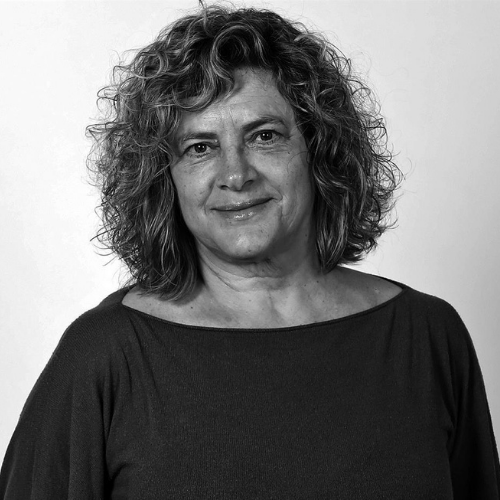
Ana Sousa Dias
Journalist. She has worked in the press, on television, radio and at agencies mainly in the area of culture. In 2003 she was awarded the Gazeta Journalism Prize.
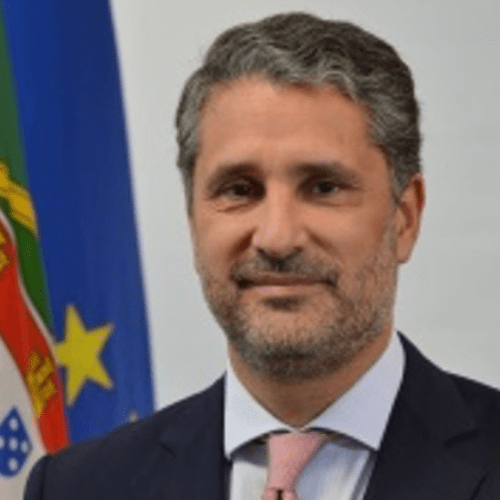
Gabriel Gameiro Rodrigues Bastos
has a degree in Law and a post-graduate degree in Legal-Administrative Sciences from the Faculty of Law of the University of Lisbon. He is the current Secretary of State for Social Security
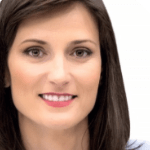
Mariya Ivanova Gabriel
Bulgarian politician and a member of the GERB party serving as European Commissioner for Innovation, Research, Culture, Education and Youth since 2019.
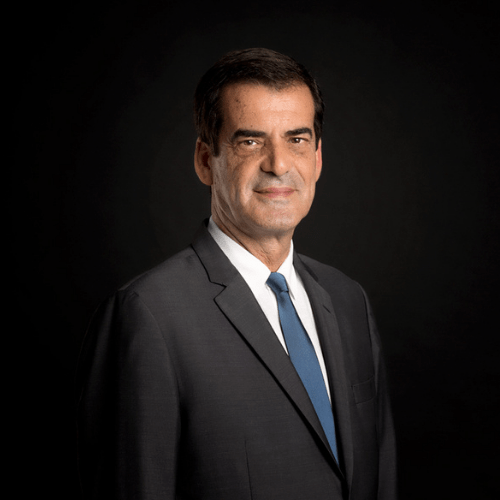
Rui de Carvalho de Araújo Moreira
businessman, association leader and current Mayor of Porto, elected on 29 September 2013.
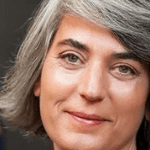
Graça Maria da Fonseca Caetano
sociologist, elected Member of Parliament in the XIII Legislature and Minister of Culture in the XXI Constitutional Government.
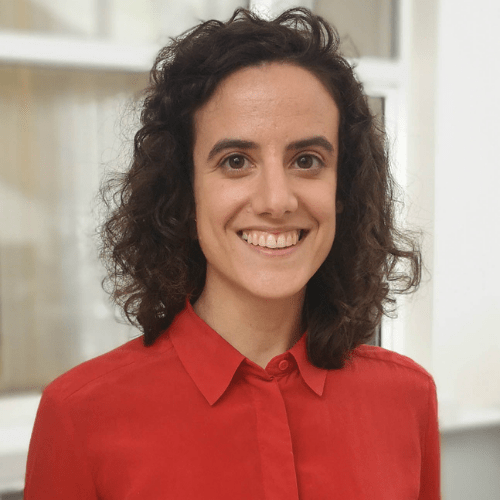
Clémentine Daubeuf
Clémentine Daubeauf is the Associate Director at KEA European Affairs. She has more than 5 years of experience in European research in culture and creative industries as well as managing international online networks.
She is responsible for KEA’s communications and has being managing communication and dissemination activities of EU-funded projects from elaborating strategies to actual implementation and coordination. As a researcher, she contributed to several studies on culture for external relations of the EU, mobility of culture professionals, innovation and collaboration between culture and other sectors (arts/science, arts/business) as well as prospective studies on the cultural and creative sectors. Clémentine has an operational knowledge of EU culture-related policies and projects through participation in European project management including Creative Europe, Horizon 2020 and Interreg Europe. Clémentine holds a MA from Sciences Po Bordeaux (FR) in Cultural Project Management. She previously worked at the Regional Agency for Cinema, Books and Audiovisual heritage in Aquitaine (FR) for a study of the regional publishing economy.
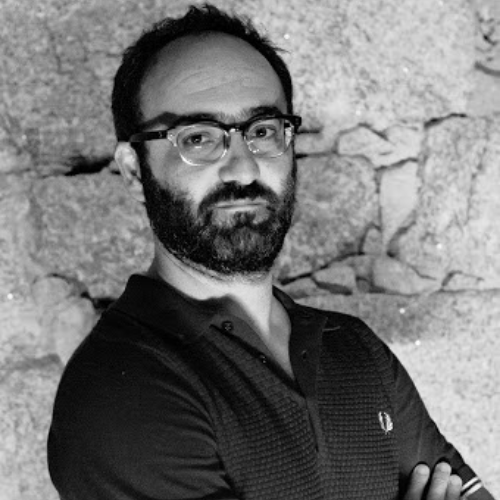
Hugo Cruz
Hugo Cruz has a PhD from the University of Porto with the topic “Community Artistic Practices and Civic and Political Participation: experiences of theatre groups in Brazil and Portugal”. He publishes and teaches in national and international contexts, in the areas of “artistic creation and public space”, “community artistic practices and civic and political participation”, “art and politics” and “cultural policies”. Noteworthy is also the coordination of the books “Art and Community ” and “Art and Hope”, edited by the Calouste Gulbenkian Foundation. He Is a Member of the external evaluation team of the PARTIS / Art for Change Initiative – Fundação Calouste Gulbenkian and Fundação La Caixa. He Is the Artistic director of MEXE_International Meeting of Art and Community. He Is also an Artistic consultant in different national and international projects (eg: municipalities, festivals and foundations). He Is a Co-founder of Pele and Nomad Art & Public Space. Hugo also assures the Artistic direction of several theatrical projects in co-construction with local communities, namely in schools, prisons, social housing districts and municipalities.
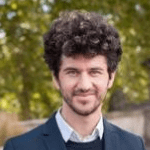
Jonathan Gross
Jonathan Gross is a Lecturer in Culture, Media & Creative Industries, King’s College London. His research addresses issues of cultural politics, participation and policy from a variety of perspectives. Central to his work are questions about the role of the state in culture, and the role of culture in human flourishing. His current projects include ‘Developing Inclusive & Sustainable Creative Economies’ (Horizon 2020), and ‘Future Festivals South Africa: Possibilities for the Age of Covid-19’ (AHRC). He has a particular interest in the capability approach to human development, and in 2019 was a member of the organising committee for the Human Development and Capability Association conference. Jonathan is a regular contributor to discussions beyond academia, sharing his research with cultural practitioners and policy makers internationally. His research typically addresses the possibilities for progressive change – working with policy makers, cultural organisations and audiences in doing so; and he has conducted several programme evaluations, directly informing the development of specific cultural projects. His latest publications include: “The Green New Deal and Cultural Policy’; “Holding Together Loss and Hope: Reflections on the Need for Art in Times of Crisis” and “Practices of Hope: Care, Narrative and Cultural Democracy”.
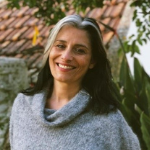
Sara Brighenti
Sara Brighenti is a museum expert, arts programmer and educator. She is currently the Deputy Commissioner of the National Plan for the Arts. Sara was the director of the Money Museum of the Central Bank of Portugal, responsible for the installation of the museum, exhibitions plan, editions, public programmes and projects with communities. Previously, she was head of education at the “Casa das Histórias Paula Rego” Museum and education and audience engagement advisor in theatres, museums and heritage sites. She was an advisor to the Ministry of Education for vocational arts education curriculum and she participated in several UNESCO’s pilot projects related to arts, culture and education. Prior, she was a museum education trainer, art teacher and worked as a freelance mediator for contemporary art museums in Portugal.
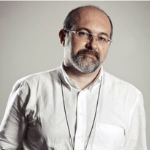
Pier Luigi Sacco
Pier Luigi Sacco, PhD, is a Senior Advisor at the OECD Centre for Entrepreneurship, SMEs, Regions, and Cities and Professor of Cultural Economics, IULM University Milan. He is also Senior Researcher at the metaLAB (at) Harvard and at the Bruno Kessler Foundation, Trento. He has been Visiting Professor, Visiting Scholar and Faculty Associate at the Berkman-Klein Centre for Internet and Society, Harvard University, and Special Adviser of the EU Commissioner to Education, Culture, Youth and Sport. He is a member of the scientific board of Europeana Foundation, Den Haag, of the Advisory Council on Scientific Innovation of the Czech Republic, Prague, of the EQ-Arts Foundation, Amsterdam, and of the Advisory Council of Creative Georgia, Tbilisi. He regularly gives courses and invited lectures in major universities worldwide, published about 200 papers on international peer-reviewed journal and edited books with major international publishers. He works and consults internationally in the fields of culture-led local development and is often invited as keynote speaker in major cultural policy conferences worldwide.
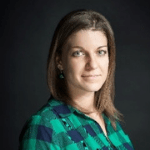
Ugnė Grigaitė
Ugnė Grigaitė is currently PhD Fellow in Global Public Health at Lisbon Institute of Global Mental Health. She holds an MSc degree in Mental Health Policy and Services from Lisbon NOVA Medical School, and a BA(Hons) first class degree in Social Work, which she obtained from the University of Lancaster, in the UK. Following several years of practicing as a Qualified Social Worker in the UK, since 2013, Ugnė has been working as project manager, expert and researcher at Lithuanian human rights NGOs: Mental Health Perspectives and Human Rights Monitoring Institute. Ugnė’s professional interests, expertise and experience mostly cover fields of human rights, mental health and well-being, disability, deinstitutionalization, prevention of torture, gender-based violence, especially intimate partner violence, and non-discrimination. Ugnė also has extensive experience in project cycle management, managing and implementing various complex national and international projects in above-outlined fields, not only in Lithuania but also in Belarus, Ukraine, Georgia, Russia, India, and Nepal. Since 2017, Ugnė has also been a member of the World Health Organization’s National ‘QualityRights’ Team in Lithuania.
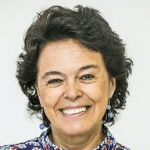
Isabel Loureiro
Isabel Loureiro is a fulltime professor of Public Health and Vice-president of the Portuguese National Health Council. President of the Scientific Board of the National School of Public Health between 2011 and 2015, she has dedicated herself to research, particularly in the area of Health Promotion in early life and intersectoral work, with primary health care, schools and municipalities. She was Director of the Department of Health Promotion and Prevention of Non-Transmissible Chronic Diseases of the National Institute of Health Doutor Ricardo Jorge, between 2008 and 2010, she has been part of the Coordination and Monitoring Committees of the National Health Plans 2004-2010 and 2011-2020. Between 1997 and 2002 she coordinated Health Promotion in Schools and the National Network of Health Promoting Schools, under the dual supervision of the Minister of Education and the Minister of Health. In 2009, she was an invited researcher at Columbia University – Teachers College (NY, USA).
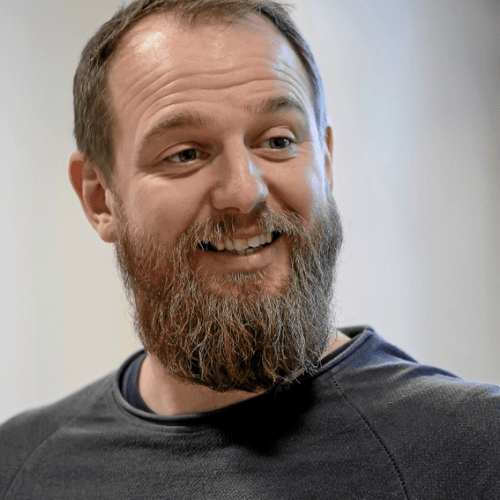
Mikael Odder Nielsen
Mikael Nielsen has a degree in musicology and has worked for eight years with vulnerable young people. Since 2016, he has been coordinating a treatment for people with depression, anxiety and stress in the city of Aalborg, Denmark. Called “Kulturvitaminer”, or “culture vitamins”, the programme offers patients meetings with professionals from various artistic fields that help take the focus off the illness and encourage self-confidence. The programme is helping unemployed people suffering from depression, anxiety, and stress, by using art, culture, and music. Partly funded by the Danish health authority and administered by the local job centre, the programme offers a crash course in culture, from visiting museums to singing and attending shows. The programme is integrated in a set of Scandinavian projects called ‘Culture by Prescription’. Participants report better wellbeing after enjoying the prescribed “treatment” and often report that the process has brought them closer to the labour market or given them new perspectives on the local community and new social networks.

Sandro Resende
Sandro Resende holds a degree in Fine Arts and has taught at the Psychiatric Hospital Centre, in Lisbon. He has curated and produced several group exhibitions within this institution. He has been directing major artistic projects since 2010 and is the founder of ‘Manicómio’ (madhouse) – a project dedicated to the raw creation by artists and other creative talents who have experienced or experience mental illness. The Manicómio Project was born in March 2019 with the main purpose of demystifying the stigma associated with mental illness, encouraging the employability of patients and promoting their social inclusion. “This isn’t therapy, it’s art”. The work resulted in several exhibitions that brought together artists with mental illness, with recognized names of the cultural arena, both Portuguese and international. This was the case of Emir Kusturica, Pedro Cabrita Reis, Jeff Koons and Jorge Molder. Beyond the artistic dimension, Sandro guarantees that artists rediscover dignity and self-esteem beyond the illness.
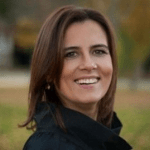
Aida Carvalho
Aida Carvalho, holds a PhD in Science of Culture, a Master’s in History of the Population, a postgraduation in Tourism and Religious Heritage, by the Catholic University of Lisbon, and in Cultural Management, by the Polytechnic Institute of Porto, and she also has a degree in European Studies. She is President of the Board of Directors of Côa Parque Foundation. Aida is a Professor at the Polytechnic Institute of Bragança, since September 2001, at the School of Communication Administration and Tourism; she also teaches in the Master’s of Tourism Marketing and in the Tourism Degree. She is a Researcher at the Centre for Research, Development, and Innovation in Tourism (CITUR). She was a Guide and Interpreter at Vale do Côa, between 1996 and 2001. Furthermore, Aida has published several articles in scientific journals, specialized in the area of heritage valuation and cultural tourism. She is a Member of the National Council for Science, Technology, and Innovation (CNCTI).
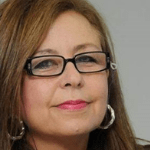
Stella Kyvelou-Chiotini
Stella Kyvelou-Chiotini is the MSP focal point for the Eastern Mediterranean. She is Associate Professor at the Department of Economic and Regional Development of Panteion University of Social and Political Sciences. She studied Architecture-Engineering at the National Technical University of Athens (NTUA) and holds a DEA and PhD in Spatial Planning, Regional & Urban Planning of the University Paris I-Panthéon-Sorbonne. She is specialized in European environmental policy, local development and Maritime Spatial Planning, carrying out research and teaching of MSP at Panteion University. Her research activities include European territorial development and cohesion, and she was a Scientific Expert of the ESPON2006 National Contact Point (2000-2006) and Director of the ESPON2013 National Contact Point (2008-2015) providing, in parallel, consultancy to the Greek Ministry of Development. She has been involved as expert in several MSP projects, namely SUPREME, IMP facility for the Mediterranean, MUSES, IMP facility for the Black Sea etc. and as a coordinator in ESPONTrain (LP), ESPON-INTERSTRAT, ESPON-USESPON, and ESPON-on-the-Road. Her research interests are focusing on blue growth, maritime spatial planning, tourism and heritage, land-sea interaction, sustainable urban development and sustainable construction inclusive growth, geography and geopolitics.
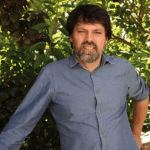
Luís Gomes da Costa
Luís Costa, curator of site-specific contemporary artistic practices, sound researcher & educator and cultural animator in rural context. Coordinator of Binaural Nodar located in the region of Viseu Dão Lafões, Portugal (www.binauralmedia.org), a not-for-profit cultural organization that since 2006 develops and hosts projects dealing with sound and visual ethnography, academic research and contemporary artistic practices, with an emphasis on sound and media arts, crossing everyday experiences, artistic creation and territorial studies. He is the coordinator of Lafões Cult Lab, a platform for media arts research that has already hosted more than 150 sound & media artists and social & environmental researchers from over 20 countries. He is also the coordinator of Binaural Nodar Digital Archive (www.archive.binauralmedia.org), a sound and audiovisual project that is gradually mapping aspects of the collective memory from the rural areas where Binaural Nodar develops its activities, which is presently part of the Tramontana European network of rural memory archives (www.re-tramontana.org) which in 2020 was awarded an Europa Nostra Prize. He co-edited the catalog and double CD “Three Years in Nodar: Context-specific artistic practices in rural Portugal”, he released a book with essays and interviews, “Living an ancient world: Texts of art and territory (2012-2008 )”, he co-edited the book + DVD “The sense of pain: Two works by Manuela Barile”, published jointly by Editions Nodar and the Italian label La Parete della Caverna and he published two books + CDs which were the result of sound education projects: “Sound Memory of Cork” with the participation of primary school children from the municipality of Santa Maria da Feira, together with entrepreneurs and workers of the cork industry and “São Pedro do Sul: New Rural Listenings” from recordings made by youths in rural villages of the municipality of São Pedro do Sul.
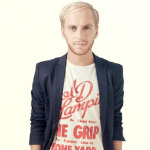
Victor Yankov
Victor Yankov is a Political Scientist, between 2013 and 2016 Victor has been festival director of the cultural festival “NIGHT / Plovdiv”, he has extensive experience in organizing and promoting large-scale cultural events, producer and moderator of the radio broadcast – Moleskin. He actively participated in building the cultural identity of the city and is co-author of a case study to save the Cinema “Cosmos” in front of the Council of Europe – “Cosmos Case”. Victor Yankov participated in numerous international forums on issues of art in public space and management of large-scale cultural projects: In Situ – Conference on Art in Public Space, Marseille, France, Open Innovation Forum 2.0, Salzburg Global Seminar etc. From joining the team of Plovdiv 2019 Foundation in 2017 till 2021 he was Deputy Director International Relations. Since 2020 Victor is part of the Pool of Experts in ‘Capacity Building for European Capitals of Culture’ project commissioned by The European Commission, Directorate General for Education, Youth, Sport and Culture (DG EAC).
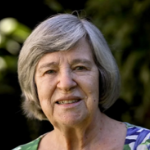
Helena Roseta
Helena Roseta, architect, has a professional and political career in the areas of housing, urban planning, municipal management, urban sustainability, gender equality and citizenship. As a constituent deputy, participated in the construction of the current Portuguese democratic regime. She held the following positions: deputy in several legislatures, mayor of Cascais, president of the Order of Architects, councilor for housing and president of the municipal assembly in Lisbon, and vice president of the Council of Europe Parliamentary Assembly. In Parliament, coordinated the Housing Working Group, launched and coordinated the approval of Portuguese Housing Basic Law in 2019. She is currently a CICS.NOVA researcher at the Faculty of Social and Human Sciences at Universidade Nova and member of this faculty’s board. Since 2017, has a personal website, www.helenaroseta.pt. Nominated national Coordinator of “Healthy Neighborhoods” Program in 2020, a public initiative to empower vulnerable communities in improving their housing and health conditions.
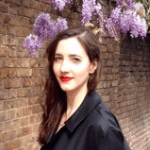
Mafalda Dâmaso
Mafalda Dâmaso is a lecturer and researcher. Her research investigates the intersections between culture, policy and international relations with a particular interest in the European Union. Currently, Mafalda is a Visiting Research Fellow in the Department of Culture, Media and Creative Industries at King’s College London and a Visiting Lecturer in the Institut Catholique de Paris. Additionally, she is a 2019–2021 Research Fellow with the Centre on Public Diplomacy of the University of Southern California. Previously, among other roles, Mafalda was Lecturer at King’s College London, Culture and Foreign Policy Expert at the German Institute of Foreign Cultural Relations, led with Culture Action Europe a research project on the European status of artists and cultural workers for the European Parliament, and worked with several cultural organisations in Europe, including the Conservatoire National Supérieur d’Art Dramatique in Paris.
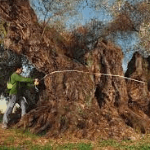
Mancomunidad Taula del Sénia : Oil and ancient olive trees: an engine for sustainable development
The Mancomunidad Taula del Sénia, is formed by 27 municipalities from 3 different autonomous communities, works for the preservation and the valuing of their ancient olive trees and environment. They have a heritage, natural and cultural value which needs to be preserved. Moreover, it contributes to the sustainable development of the territory. The Mancomunidad Taula del Sénia, has worked for the preservation and the valuing of the ancient olive trees and their environment for years now. The project started with the citizens concern about the plunder of these monumental trees. From this, an inventory was made and nowadays it includes almost 5.000 ancient olive trees with at least 3.5 m of perimeter at 1.3 m from the ground. Therefore, working together public and private sectors and with the cooperation of other governments, excellent results have been achieved. The ancient olive trees are a unique, natural, historic and cultural heritage which is delicate at the same time. Therefore, it needs a constant and collective work to ensure its survival although it is an engine of sustainable development of the territory. Moreover, visibility and appreciation at an European level are of key importance for the future of the ancient olive trees in Territorio Sénia.
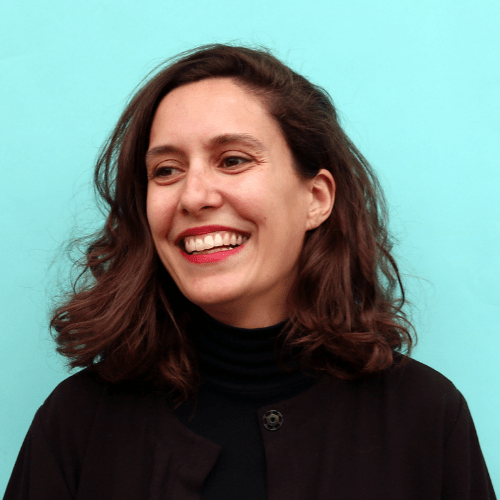
Mariana Pestana
Mariana Pestana, PhD in architecture from Bartlett School of Architecture, she is co-director of The Decorators atelier. She conducts research in contemporary culture through an independent curatorial practice, having recently held the exhibitions The Future Starts Here (Victoria and Albert Museum, 2018) and Eco Visionaries: Art and Architecture After the Anthropocene (MAAT, Lisbon, Matadero, Madrid and Royal Academy, London 2019-20) and Fiction Practice: Prototyping the Otherwordly (Porto Design Biennale, 2020). She taught at Central Saint Martins, Chelsea College of Arts and Royal College of Arts, in the United Kingdom, and worked as a curator in the Department of Architecture, Design and Digital at the Victoria and Albert Museum (2015-19). She was appointed curator of the 5 th Istanbul Biennial of Design (2020-21). She is a researcher and deputy director of the Center for Other Worlds and Invited Assistant Professor in the Communication Design course at the Lusófona University of Humanities and Technologies.
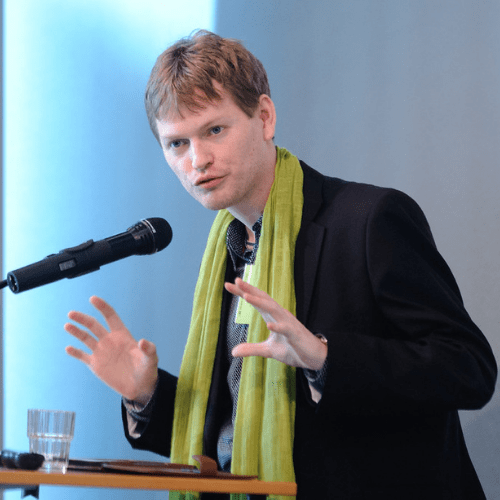
Sacha Kagan
Sacha Kagan studied History at Université Bordeaux 3, Political Sciences at Sciences Po Bordeaux, Cultural Economics & Cultural Entrepreneurship at Erasmus Universiteit Rotterdam (with Huygens Scholarship), and did a PhD (Doktor der Philosophie) at Leuphana Universität Lüneburg with a thesis on Art and (Un-)Sustainability. He was a Research Associate at Leuphana Universität Lüneburg from 2005 to 2018. From 2006 to 2016, he was the founding coordinator of the international network “Cultura21: Cultural Fieldworks for Sustainability”. From 2015 to 2017, he was the Coordinator of Research Network ‘Sociology of the Arts’ at the European Sociological Association (and Board Member from 2011 to 2019). From 2015 to 2018, he was the leader of the research area “creative and artistic practice for sustainable urban development” at the Research Consortium “City as Space of Possibility” (Stadt als Möglichkeitsraum). He received the “Basarab Nicolescu Transdisciplinary Science and Engineering Award” 2018 from the Academy for Transdisciplinary Learning and Advanced Studies (ATLAS). Dr. Kagan intervened at over 130 events in 33 countries, authored over 70 publications, directed 3 documentary films, and contributed in various roles to a dozen art projects. He is currently habilitating at Leuphana Universität Lüneburg.
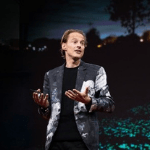
Daan Roosegaarde
Dutch artist and innovator Daan Roosegaarde is a creative thinker and maker of social designs which explore the relation between people, technology and space. He founded Studio Roosegaarde in 2007, where he works with his team of designers and engineers towards a better future. Together they develop ‘Landscapes of the Future’ building smart sustainable prototypes for the cities of tomorrow. Roosegaarde has been driven by nature’s gifts such as light emitting fireflies and jellyfish since an early age. His fascination for nature and technology is reflected in his iconic designs such as Waterlicht (a virtual flood) and Smog Free Project (the largest outdoor air purifier in the world which makes jewellery from smog) and Space Waste Lab (the mission to upcycle junk that floats in space). Roosegaarde graduated from The Berlage Institute with a master in architecture. He is a Young Global Leader at the World Economic Forum, a visiting professor at several universities, was selected by Forbes and Good 100 as a creative change maker and named Artist of the Year 2016 in The Netherlands. Roosegaarde has been the recipient of numerous prestigious awards including the Shenzhen Global Design Award, Ethics Ethical Award, World OMOSIROI Award Japan, Dezeen Award, London Design Innovation Medal, DFA Gold and Grand Award Hong Kong, LIT 2017 Lighting Designer of the Year Award, D&AD Awards 2017, the World Technology Award, two Dutch Design Awards, the Charlotte Köhler Award, and China’s Most Successful Design Award. He has exhibited at the Design Museum London, Stedelijk Museum Amsterdam, Rijksmuseum, Tate Modern, Tokyo National Museum, Le Musée des Arts Décoratifs Paris, Victoria & Albert Museum, and various public spaces across the globe. Daan Roosegaarde frequently shares his visionary ideas at conferences across the world such as TED , World Economic Forum and NASA. Recently a new monograph of Daan Roosegaarde was published by Phaidon.
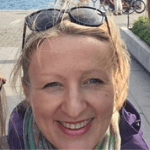
Anna Kedziorek Ramirez
Anna Kedziorek is a Policy Officer in the Cultural Policy Unit of the Directorate General for Education and Culture (European Commission). She has been working on the EU policy on gender equality in cultural and creative sectors since 2019, implementing the actions foreseen under the EU Work Plan for Culture 2019-2022. Most recently, she has coordinated the Open Method of Coordination (“OMC”) experts’ group on this topic. Other fields of Anna’s interest include the role of culture for social cohesion, the EU competition law and fighting illicit trade in cultural goods. She has been involved into several activities in this field, including the preparation of legislative measures; design, negotiation and implementation and monitoring of projects; cooperation with the international organisations and EU national authorities. She holds Master’s Degrees in Law and European Studies (University of Poznan, Poland), a Master’s Degree in Intellectual Property Law (University Aix-Marseille III, France) and an LLM in European Law (College of Europe, Bruges, Belgium).
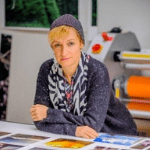
Pauliana Pimentel
Pauliana Pimentel is a freelance artist and photographer. She has been working as a photoreporter since 1999 for several Portuguese and foreign newspapers and magazines. Part of her work belongs to private and institutional collectors, such as Fundação Calouste Gulbenkian, Partex, Fundação EDP and Novo Banco. In 2016, she was nominated for the “NOVO BANCO Photo 2016″ Award, with the series “O Comportamento do Ser ”, having presented “Quel Pedra” at the Berardo Museum in the same year. In 2015, she won the Visual Arts Award, for the best photographic work of the year, with “The Passenger” by the Portuguese Authors Society. She also produced several films: “Diz-se que Portugal é um bom país para se viver” in 2011; “Youth of Athens / Youth of Athens”, in 2012 and “Entre Nous” in 2014. In 2005, she participated in the photography course of the Gulbenkian Creativity and Artistic Creation Program. Pauliana was part of the collective [Kameraphoto] from 2006 until its extinction in 2014. In 2016, she founded the new collective “N’WE”. In addition to collective books, in 2009 her first author book ‘VOL I’ was published by the publisher Pierre von Kleist and ‘Caucase, Souvenirs de Voyage’ by the Calouste Gulbenkian Foundation in 2011.
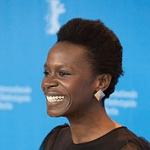
Isabél Zuaa
Isabél Zuaa is a Portuguese actress and performer born in Lisbon. In 2017, she won the Brazilian Guarani Cinema Award, in the category Revelation of the year, by her role in the movie “Joaquim” by Marcelo Gomes. In 2020, she was distinguished by the Cinema festival of Gramado with two awards, for Best Actress, by her display in the feature film “Um Animal Amarelo” by Filipe de Bragança, and in the short film “Deserto Estrangeiro” by Davi Pretto. Isabel graduated in Theatre in the Higher School of Theatre and Cinema, where she took part in an Exchange programme which led her to graduate in Performing Arts in Brazil. Since 2010, she has been crossing between Dance, Cinema, Theatre and Television projects. In the course of her career, she took part in several films like “O nó do diabo” in 2016, “As Boas Maneiras”, “Selvageria” and in the series “SUL”.
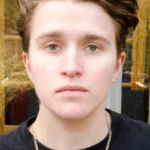
Maxie Gedge
Maxie Gedge is Project Manager at Keychange, a movement aiming to empower talented underrepresented genders with training, mentoring, and network support plus conferences and showcasing opportunities at partner festivals. Maxie joined PRS Foundation in May 2016 and delivers the communications strategy including the website and social media. Maxie has a wealth of musical experience in many different roles – she runs a musical collective called Gravy, has a MMus in Sonic Arts, and currently plays drums in Graceland and Current Bond. She has worked for festivals, venues and talent development organisations in a range of genres, programmed hundreds of new music shows, and also promotes and DJs at queer dance parties.
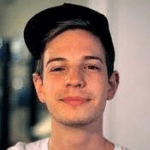
Paul Vautrin-Grévisse
Paul Vautrin-Grévisse is a Equality and Diversity Officer at the French Ministry of Culture and expert to the OMC Group on “Gender Equality on the Cultural and Creative Sectors”. This Working Group was established under the current Work Plan for Culture 2019-2022 which defines the priorities of Member States at the European level. Its works have been focusing on the role that culture plays in promoting gender equality and, more importantly, how to achieve gender equality within the cultural and creative sectors (CCS). The Group has produced a report to examine the main obstacles and specific challenges faced by women and to identify promising initiatives aiming to promote gender equality in the cultural sphere. It covers key gender gaps and suggests concrete policy recommendations. To better illustrate the recommendations, a selection of different good practices from as many EU Member States as possible demonstrate the relevance and effectiveness of the outlined recommendations.
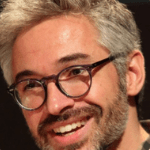
Pedro Sobrado
Pedro Sobrado, editor, playwright, university professor. Graduated in Communication Sciences, post-graduated in Contemporary Culture and New Technologies and Master in Theatre Studies. Between 2006 and 2017, he worked in the Editions department of Teatro Nacional São João, ensuring the editorial coordination of TNSJ’s collection of dramatic texts in the Húmus publishing house and of other publications, while also commissioning or organising colloquia, conferences and seminars. He has been Chairman of the Board of Directors of the institution since February 2018. As an author, trainer and lecturer, he has also collaborated with places such as São Luiz Teatro Municipal, Comédias do Minho and Balleteatro Escola Profissional, and the poetry and criticism project Jogos Florais. He has written about authors such as Gil Vicente, Almada Negreiros, Bertolt Brecht, Karl Kraus, Walter Benjamin, Robert Walser, Flannery O’Connor, as well as about the relationship between the Bible and literature.
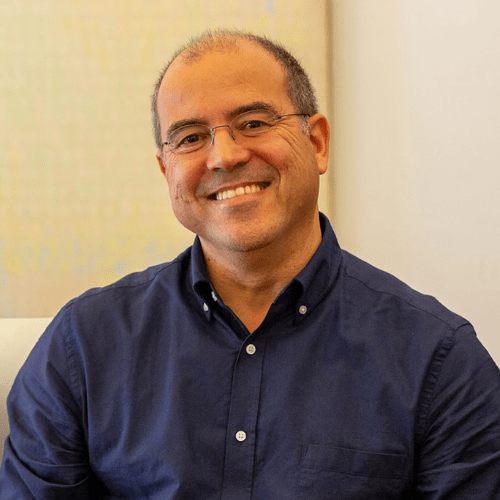
Nuno Artur Neves Melo da Silva
fiction writer, playwright, screenwriter, entrepreneur, producer, programmer, presenter and administrator. He is, since October 2019, the Secretary of State for Cinema, Audiovisual and Media of the XXII Portuguese Government.
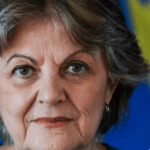
Elisa Maria da Costa Guimarães Ferreira
economist and current European Commissioner for Cohesion and Reforms since 2019.
Chat
Warning: Undefined array key "eael_tooltip_section_width" in /home/digital/public_html/wp-content/plugins/essential-addons-elementor/includes/Extensions/EAEL_Tooltip_Section.php on line 434
Warning: Undefined array key "eael_tooltip_section_width" in /home/digital/public_html/wp-content/plugins/essential-addons-elementor/includes/Extensions/EAEL_Tooltip_Section.php on line 434
